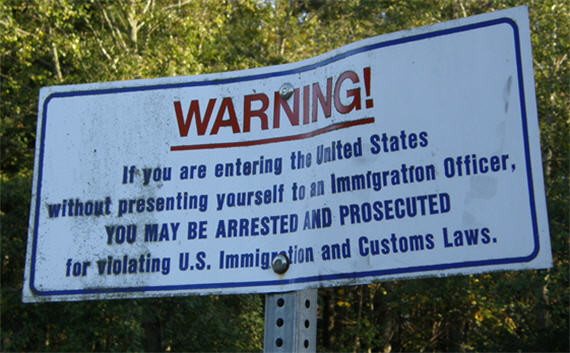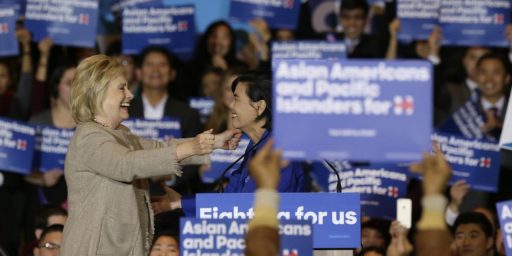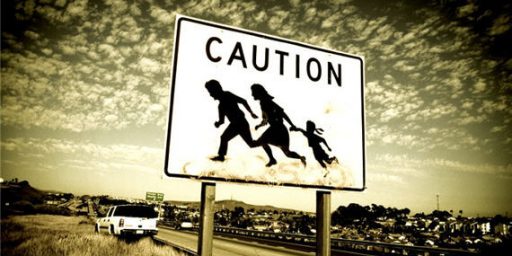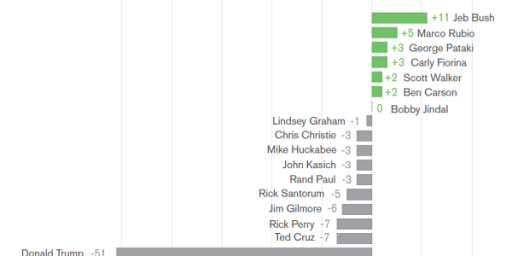Immigration To The U.S. Now Dominated By Asians
The largest group of immigrants to the United States doesn't come from south of the border anymore.
Throughout American history, the nation has changed as the sources of immigration have changed. In the 19th Century, immigrants came from Europe for the most part, but at different times the bulk of immigrants came from different parts of Europe ranging from Ireland to Italy to Germany to Eastern Europe. Each new group brought their own customs to their new nation, many of which became part of American culture as a whole. In the 20th Century, as immigration laws changed, the major sources of immigration came from Mexico and Central America, and we’ve seen the same thing happen with elements of Hispanic culture being assimilated into America as a whole. Now, it looks like we’re undergoing another shift that is bound to have its own impact on the United States:
Asians have surpassed Hispanics as the largest wave of new immigrants to the United States, pushing the population of Asian descent to a record 18.2 million and helping to make Asians the fastest-growing racial group in the country, according to a study released Tuesday by the Pew Research Center.
While Asian immigration has increased slightly in recent years, the shift in ranking is largely attributable to the sharp decline in Hispanic immigration, the study said.
About 430,000 Asians — or 36 percent of all new immigrants, legal and illegal — moved to the United States in 2010, compared with 370,000 Hispanics, or 31 percent of all new arrivals, the study said. Just three years earlier, the ratio was reversed: about 390,000 Asians immigrated in 2007, compared with 540,000 Hispanics.
“Asians have become the largest stream of new immigrants to the U.S. — and, thus, the latest leading actors in this great American drama” of immigration, Paul Taylor, executive vice president of the Pew Research Center, wrote in the report.
Immigration scholars have attributed the decrease in Hispanic immigration to a mix of factors, including the economic downturn in the United States, increased deportation and border enforcement by the American authorities, and declining birthrates in Mexico.
Tougher enforcement measures have made a greater impact on the Hispanic immigrant population than on the Asian immigrant population because a much higher percentage of Hispanics are in the United States without immigration papers, experts said. About 45 percent of Hispanic immigrants in the United States are here illegally compared with about 13 percent to 15 percent of Asian immigrants, Pew demographers found.
Under this pressure, Hispanic immigration dropped 31 percent from 2007 to 2010, while Asian immigration increased about 10 percent.
Pew researchers estimated that Asian immigration surpassed Hispanic immigration by 2009. Mr. Taylor said in an interview on Monday that the delay in identifying this shift was due in part to the fact that the analysis relied on later demographic data, including the 2010 American Community Survey.
The differences between this new wave of Asian immigration and the ones that came before it are rather interesting:
Compared with the educational attainment of the population in their country of origin, recent Asian immigrants also stand out as a select group. For example, about 27% of adults ages 25 to 64 in South Korea and 25% in Japan have a bachelor’s degree or more.2In contrast, nearly 70% of comparably aged recent immigrants from these two countries have at least a bachelor’s degree.
Recent Asian immigrants are also about three times as likely as recent immigrants from other parts of the world to receive their green cards—or permanent resident status—on the basis of employer rather than family sponsorship (though family reunification remains the most common legal gateway to the U.S. for Asian immigrants, as it is for all immigrants).
(…)
Despite often sizable subgroup differences, Asian Americans are distinctive as a whole, especially when compared with all U.S. adults, whom they exceed not just in the share with a college degree (49% vs. 28%), but also in median annual household income ($66,000 versus $49,800) and median household wealth ($83,500 vs. $68,529).4
They are noteworthy in other ways, too. According to the Pew Research Center survey of a nationally representative sample of 3,511 Asian Americans, conducted by telephone from Jan. 3 to March 27, 2012, in English and seven Asian languages, they are more satisfied than the general public with their lives overall (82% vs. 75%), their personal finances (51% vs. 35%) and the general direction of the country (43% vs. 21%).
They also stand out for their strong emphasis on family. More than half (54%) say that having a successful marriage is one of the most important things in life; just 34% of all American adults agree. Two-thirds of Asian-American adults (67%) say that being a good parent is one of the most important things in life; just 50% of all adults agree.
Given these rather traditionalist views on family, which are also reflected in other results in the survey that touch upon such things as the role that parents should have in their children’s career and marriage choices along with a much higher percentage of families that like in multi-generational households, one would think that Asian-Americans would be a naturally Republican constituency. However, that isn’t the case at all:
Compared with the general public, Asian Americans are more likely to support an activist government and less likely to identify as Republicans. Half are Democrats or lean Democratic, while only 28% identify with or lean toward the GOP. Among all American adults, 49% fall in the Democratic camp and 39% identify with or lean toward the Republican Party. Indian Americans are the most heavily Democratic Asian subgroup (65%), while Filipino Americans and Vietnamese Americans are the most evenly split between the two parties.
President Obama gets higher ratings from Asian Americans than from the general public —54% approve of the way he is handling his job as president, compared with 44% of the general public. In 2008, Asian-American voters supported Obama over Republican John McCain by 62% to 35%, according to Election Day exit polls.12
On balance, Asian Americans prefer a big government that provides more services (55%) over a smaller government than provides fewer services (36%). In contrast, the general public prefers a smaller government over a bigger government, by 52% to 39%.
This is consistent with the 2008 Election, where the Exit Polls show that Asian-Americans went overwhelmingly for President Obama 62% to 35% although they only made up 2% of the electorate that year while comprising about 5% of the population according to the 2010 Census. At the same time, though, Asian-Americans tend to be somewhat less politically active than the population as a whole, with about 50% of those eligible voting in 2008 compared with 67% of the eligible population as a whole. So, despite the new wave of immigration, it’s going to be some time before they become a group that has a significant impact on the election. Most likely, we’ll see it first in states like California where they make up a slightly larger share of the population. Comparatively, Hispanics make up 16% of the population and that percentage is likely to continue rising given birth rates and family size. In short, then, we’re looking at an interesting historical landmark here, and one that is likely to have an impact on American culture as a whole. Politically, though, Asian-Americans aren’t likely to become anything close to the type of political force that Hispanics have become absent even more radical changes in immigration patterns and birth rates.







As an Asian-American, I would say that it would be possible for Republicans to attract me as a voter, but to do that, they’re going to have to drop the anti-intellectualism, anti-(legal) immigration, and the culture wars.
It is a big opportunity missed by the GOP. Here in San Francisco the Chinese-American community is now the middle class base of San Francisco, they own businesses, and many commercial and residential properties throughout the city.
They are now finally flexing their electoral power and to my surprise they are generally moderate Democrats – I always thought that when this community went to the polls in numbers that it would be as Republicans. Businesses are highly regulated in the city and I thought the GOP would benefit from that – they have not.
@Anon:
Heh.
Sadly it is more likely you’ll be on the other side of a “two cultures” split. As our frequent commenters press home, they want a “science or religion” choice.
@al-Ameda:
It would be interesting if the GOP wanted Chinese rules (none) here, and the ex-Chinese felt otherwise.
Sigh…
For a lot of us, the problem has never been “immigration.” It’s always been illegal immigration.
We, as a nation, have the right and the duty to control our borders, and regulate those who come here. We do so through our immigration laws.
If you don’t like them, feel free to try to change them. Hell, Marco Rubio was working on just that before Obama cut him off at the knees. Oh, and Rubio has confirmed the Obama administration didn’t once try to work with him on the issue, or even notify him about their latest change in policy. It’s almost like Obama is more interested in getting political advantage from the situation than actually trying to solve it.
Might have something to do with this:
@Jenos Idanian #13:
Actually, the Obama Administration has deported over 400,000 illegal immigrants. But to hear Republicans, the unwashed masses are streaming across are borders in unprecedented numbers.
A politician try to gain political advantage? I can’t imagine that. So, I take it that you don’t think that Rubio was trying to shore up the GOP’s declining numbers with Hispanic and Hispanic voters by proposing his version of a dream act?
@Anon: So you want them to drop their base. Don’t see that happening!
@al-Ameda:
Sorry, it’s ….
That’s what’s often claimed, but, sorry, I don’t feel it. It just feels like lip-service to me. If the distinction is merely legal vs. illegal, then Republicans could reduce illegal immigration simply by relaxing barriers/quotas to legal immigration, pushing for guest worker programs (with a path toward citizenship), etc. Instead, I think that much of the Republican base is just plain anti-immigration, and conveniently stack the cards so that there is enough illegal immigration that they can use as a smoke-screen for their true feelings.
There are a few Republican politicians (Bush among them, actually, if I recall correctly) who I think have managed to convince me that they personally welcome immigrants. They tend to be in the minority, though, and are routinely shouted-out by the anti-immigration crowd.
Simply put, even though I and my extended family have never been illegal immigrants, I don’t feel welcome in the Republican party. The ironic thing is that I say this as someone who actually is neutral at best to things such as bi-lingual government services, etc.
Perhaps.
But, the thing is, I, as most Americans, only have a limited amount of time and attention. Occasionally, a Republican will propose some immigration policies/laws that seem to be a sincere effort. He/she quickly backtracks, though, after being threatened by the Tea Party or some such, and it quickly disappears from the headlines. So, mostly what I hear/read about are things like electrified fences, machine gun posts along the border, etc.
Great.
The Republicans could easily have passed what Obama proposed as a separate law. There is no way that Obama would have dared to veto it, politics notwithstanding. But they didn’t.
@Anon:
I wonder why Republicans didn’t bring it forward?
@Jenos Idanian #13: Really? Just what it looks like is that you and your tribe have a really ugly case of xenophobia. When was the last time we had calls for widespread raids on Asian or Irish or Eastern European illegals? It sure looks like someone with brown skin whose family has been here since the 1500s needs to carry papers while no one even considers whether or not the Ukranian office cleaner has overstayed her visa.
@Jenos Idanian #13: Hell, Marco Rubio was working on just that before Obama cut him off at the knees.
How?
Rubio can still pursue whatever legislation he wants. Obama hasn’t changed that.
@Jenos Idanian #13: The POTUS could consult from tens if not hundreds of advisers, 535 members of congress, relevant heads of state (like Mexico), or fifty governors. But for some reason he chose not to ask advice from someone who is a potential opponent in the upcoming election? Wow, we are all shocked and appalled.
Also, congratulations on the successful troll.
Just because some noisy Republicans talk so much about policies they think are “pro-family” does not mean that Democrats or independents are any less committed to their spouses or kids. One can, for example, think that it is pro-family to allow you to marry whoever you love or that all children have access to adequate health care, education, and a safe and clean environment.
@Jenos Idanian #13: “Hell, Marco Rubio was working on just that before Obama cut him off at the knees.”
Thanks, Jenos, for parrotting the RNC Lie of the Day.
Rubio had been TALKING about coming up with this bill for months. And for months and months, he kept saying “it’s coming, just wait, it’s going to be really neat.” And nothing.
And it never was going to be anything. It was just a vague promise of possible future action, just to keep from losing a handful a really gullible Hispanic voters.
How long was the Obama administration required to wait, in your mind, for the junior senator from Florida to finally get around to introducing a bill? A year? Four years? Until the junior senator gave him permission to act?
And he never even talked to Rubio! Oh noes! The president of the United States made a decision without consulting one of the most junior members of the senate. There must be something in the constitution against that.
Meanwhile, John Boehner, who two months ago was saying he liked the Dream act but there was no way he could get it through congress, is also singing the Jenos song — “Oh, we were just about to pass that thing, and now the big black meanie has ruined it for everyone.”
Do you even believe yourself when you type this stuff?
@al-Ameda: “So, I take it that you don’t think that Rubio was trying to shore up the GOP’s declining numbers with Hispanic and Hispanic voters by proposing his version of a dream act?”
Or by promising that really soon he’d figure something and then he’d someday get around to almost being ready to propose it…
Jenos please.
Normally you present mostly credible viewpoints. But here you’re just beclowning yourself. You can’t really believe that anybody outside the talk show circuit will fall for this vaporware.
The cognitive dissonance between Asian-American belief systems and issue-based viewpoints on the one hand and that demographic’s partisan voting patterns on the other hand really is on several levels amazing. Obviously the biased U.S. media plays a significant role, as does the Republican Derangement Syndrome inherent in public and even private schools. Of course a lot of Asian immigrants who’ve recently started to participate in the process are young and inexperienced and that plays directly into the Democrats’ hands. That the partisan splits are so wide, however, suggests additional factors. What those factors are would be interesting to know.
And their female children will be playing pro golf. If Journalist Mark Reason is still alive then, his head is likely to explode.
Lets see, educated, better off than most, family oriented, work ethic, obeys authority, bootstrap/grindstone practitioners ….should be a natural cohort of the republican party.
Yet they see quite clearly what the rest of you wingnuts will deny till death: viz. the GOP is a bunch of redneck white racist christianists clearly uncomfortable with gays, minorities, change and progress.
You can gainsay it any way you want (and you wingnuts do) but the reality of such disgusting, ignorant views is certainly not lost on an educated minority who are naturally repelled by such thinking.
@Tsar Nicholas:
(1) Do you actually believe that Republicans are deranged? Or
(2) Are you saying that Asian-Americans are somehow brainwashed into voting for or preferring Democratic Party politicians?
@nightrider:
Bussing children across town to the bad schools is not pro-familiy (See Seattle, Louisville, and now Raleigh). Giving 8a housing vouchers to poor people so that they can move into your neighborhood is not pro-family. (See Chicago and Memphis). Eliminating lab sciences and foreign language education to have more money to fund ESL and remedial education is not pro-family.
Look at the bluest cities in the U.S. such as NYC, Boston, DC, Philly, St Louis, MIlwaukee, Los Angeles. All of the school systems have very few middle class children who have both a mother and a father.
The Democrats are pro-single mother, pro-gang bangers, and anti-academic learning. Not exactly pro-family.
From what I’ve seen of more sophisticated demographic analyses, Asian-Americans tend to vote on average somewhat more conservatively (and more pro-GOP) than the surrounding area, but also tend to live in (and especially new arrivals immigrate to) states that are fairly liberal and Democratic.
Being a moderate Democrat in California or New York *is* being to the Right of the state consensus. (And absolutely the case in Hawaii, which has a lot of the long-time residents with Japanese ethnicity as well.) Political party choice is definitely affected by the dominant party of the state in which people live.
Note that there are some profound differences among different groups of Asians. Vietnamese, for example, along with Filipinos are actually more GOP than the US population as a whole. (There are some obvious reasons with the Vietnamese; LOTS of pro-McCain stickers in Eden Center, a Vietnamese shopping center, in 2008.)
Funny thing about legal immigration. The last vote I know of to increase legal immigration (but only H1-Bs) was in 2007, when the economy was doing better. Almost all Republicans voted to raise the cap, and almost all Democrats voted against. Now, there’s a lot of room to criticize H1-Bs, but it would be more legal immigrants.
When it comes to immigration, the Democrats talk like doves but often vote like hawks. The Republicans do the reverse.
This ground seems to have been pretty well trodden, but to add my two cents on contrasting pro-family values with Democratic votes:
My Anglo dad and my Asian mom both emigrated here back in the sixties, and they both are very proud Americans who firmly believe in cultural assimilation – my mom even more than my dad. But they also remember good and well that their family used to be just barely acceptable in polite society. It doesn’t help that Asian-Americans tend to be stuck in the nineties, when – according to my mom at least – hating your parents and ruining your life to get back at them was cool.
@superdestroyer: What have you been smoking? It’s the Democrats who want to increase funding for science and technology and the Republicans who want to cut, cut, cut everything.
@grumpy realist:
The Berkeley California school board disagrees with you.
http://www.eastbayexpress.com/ebx/berkeley-high-may-cut-out-science-labs/Content?oid=1536705
Look at how the Democrats have opposed charter schools, magnet schools for sciences (read Chris Hayes and look up racial quotas proposed for Thomas Jefferson High School), and opposed lab sciences in schools.
It does not benefit the core groups of the Democratic Party (blacks, Hispanics, public sector unions) to have educated white children.
Also, the Democrats seem intent of destroying healthcare as a good career field and want to convert it into the same type of career field as inner city high school teacher.